“WTF is this?” someone asked me on Instagram.
I’d already gotten the exact same question from two other friends who’d watched my Instagram story. IRL, I’d received similar responses all week after telling people about my Saturday night plans.
Sleeping in a room with 160 strangers during an eight-hour overnight concert seemed incomprehensible to everyone I know, but that essentially sums up British Composer Max Richter’s performance of Sleep at Spring Studios in downtown Manhattan last Friday and Saturday nights. Richter, who’s written for ballet, opera, and film, teamed up with a neuroscientist to determine which sounds and tones enhance slow wave sleep — the deepest stage of sleep, which helps you recharge physically and mentally.
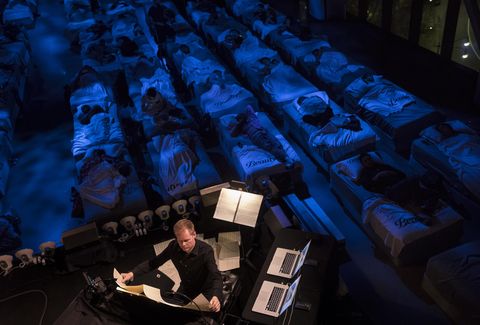
Beautyrest
In 2015, Richter recorded a 31-song album as a lullaby of sorts, which has been turned into sleepover-concerts at the Wellcome Collection museum in London, the Philharmonie de Paris in France, SXSW in Austin Texas, and now, at Spring Studios in New York City. Beautyrest sponsored the event in NYC, providing beds that were donated to Help USA after the show.
I didn’t find it strange that people would pay $250 to sleep in a room filled with twin-sized mattresses while Richter, accompanied by the American Contemporary Music Ensemble, played for eight hours straight; the sleeping arrangements weren’t that far off from staying in a hostel. However, not all my fellow concert-goers were open to communal napping.
Case in point: A woman eyed my pajamas in the studio’s bathroom and commented, “Wow, you’re actually staying here tonight? That’s so cool.”
Confused, since I thought that was the whole idea, I questioned what she was doing at the event.
“Oh, I just came to listen to the music for a while.”
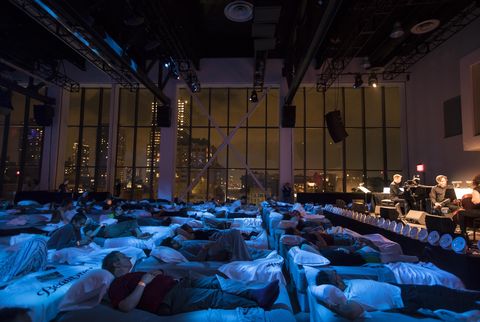
Huh. But according to Richter, there is no right way to attend Sleep.
“I feel like there aren’t any rules,” he told me. “People find their own way with it.”
There are people who arrive, go to bed, fall asleep, and wake up in the morning, he says; others might spend the whole night listening rather than snoozing. Most people do a bit of everything, meaning they’ll nap, wake up to catch a few tunes, then drift back to sleep.
“It’s very informal,” he explained. “It feels like an open community really.”
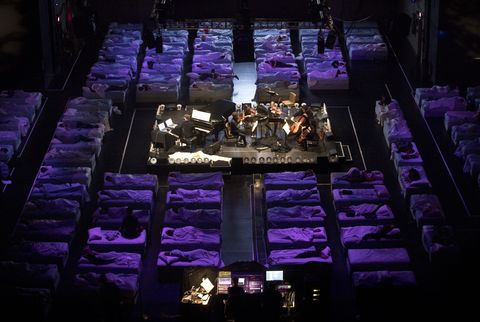
A traditionalist, I decided to treated Sleep as a lullaby and skip out on drifting in and out of consciousness. Dr. Rebecca Robbins, Beautyrest sleep expert, says that in a conventional setting — you know, a room with a door — classical music can be useful for those who toss and turn. In fact, numerous studies have shown that listening to music at bed time can help people with sleep disorders get a better night’s rest and reduce how long it takes to finally drift off.
“Soft classical in particular is helpful before bed and is particularly helpful for people with insomnia,” Robbins explained.
After settling onto my mattress, I looked around to see what others were doing. Except for Richter and the orchestra, who occupied a stage at the front of the large, dark room, the entire space was filled with kid-sized beds with Beautyrest blankets. Most people had tucked themselves in for the night, though some sat perched on top of the sheets, completely focused on the performance. Several beds down from mine, a couple was kissing. Many, myself included, were idly perusing Instagram, Facebook, and email, which seemed at odds for Richter’s vision for the show (not to mention bad for our sleep).
“We’re on 24/7 and the screens are always buzzing away at us,” he said. “My ambition really is to provide a moment of pause. A moment of repose.”
Eventually, I broke with my nightly Instagram ritual, put the phone away, and listened to the soft classical music floating from stage.
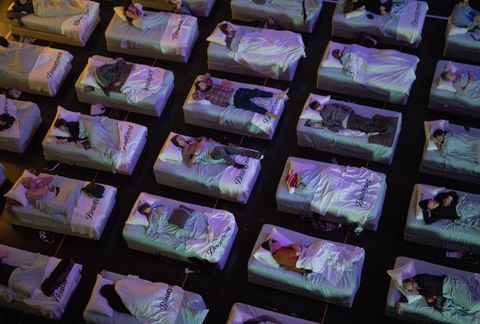
The next time my eyes opened, it was morning, and light was softly streaming through the windows. The room was emptier than before: I guess my friend in the bathroom wasn’t the only one who decided to ditch the venue for the comforts of home.
I tried to determine if I had actually slept better. I was certainly energized for being awake at 6 a.m. on a Sunday morning, but I’m not sure I ever entered a deep stage of sleep. The wine I drank the night before could have had something to do with it, not to mention sleeping in a foreign environment.
The music seemed more upbeat than what I’d heard the previous night. Richter explained the final few songs prod you awake — similar to how the sun informs you when it’s time to rise.
“The whole piece is sort of aiming towards this last hour, which gets a bit brighter and more energized,” he said.
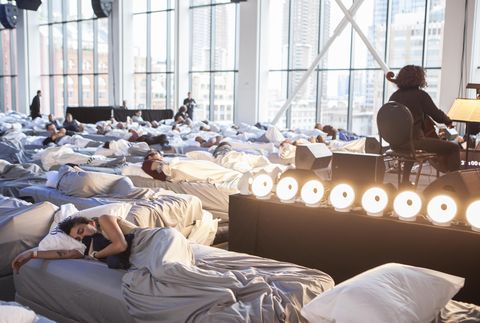
Just before 7 a.m., the concert ended. A short meditation and stretching session followed to start our day.
I gathered my things, walked to the subway, and took the train back home. Naturally, I checked Instagram, and found a new message from the friend who sent a “WTF?” message earlier. “LOL wut, sounds cray,” he’d responded to my explanation of the event.
Later, I asked Richter if he gets similar reactions when he explains the concept to people.
“Obviously it’s kind of crazy,” he said. “I don’t mind people thinking I’m crazy.”
Source: Read Full Article
